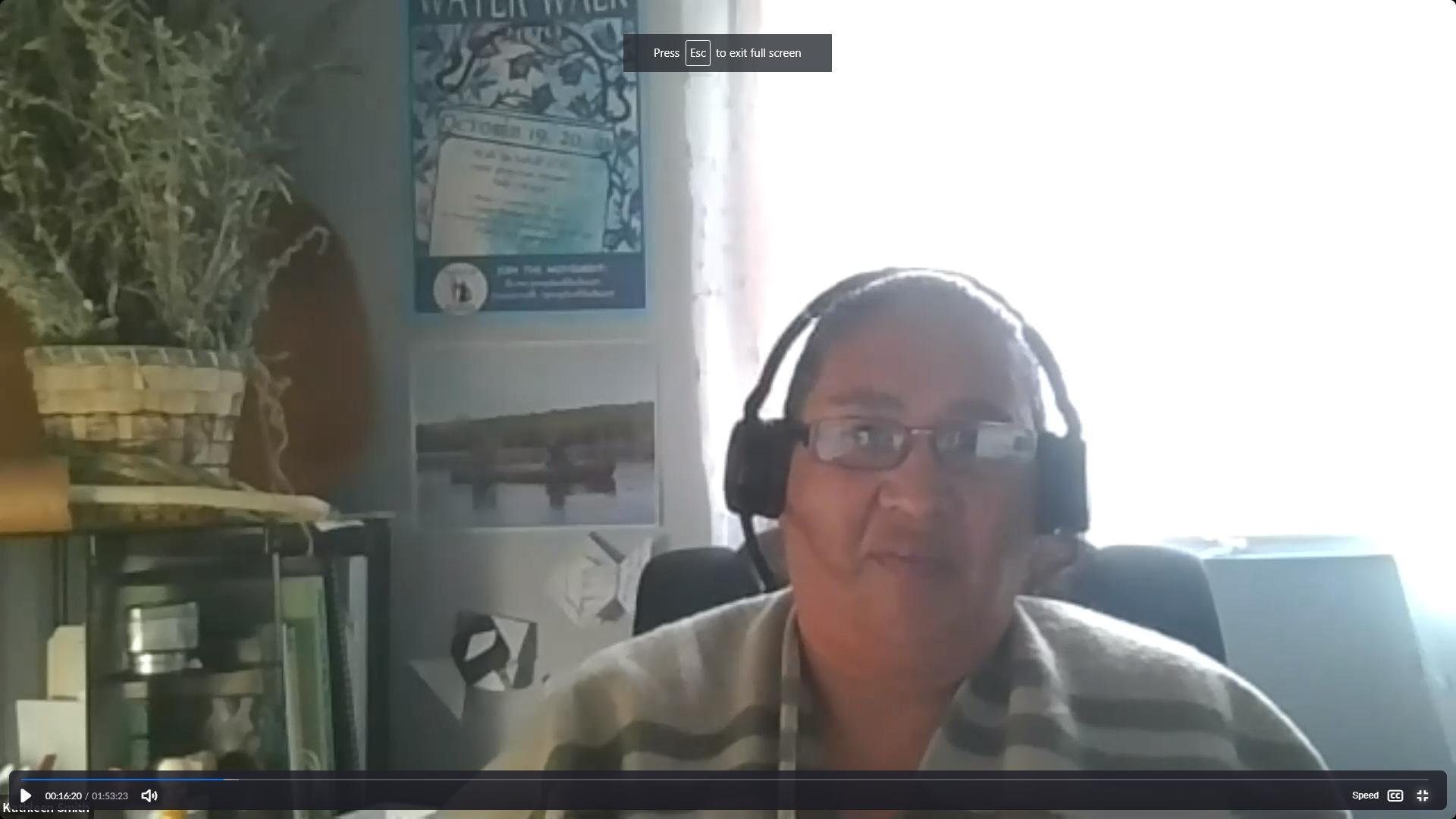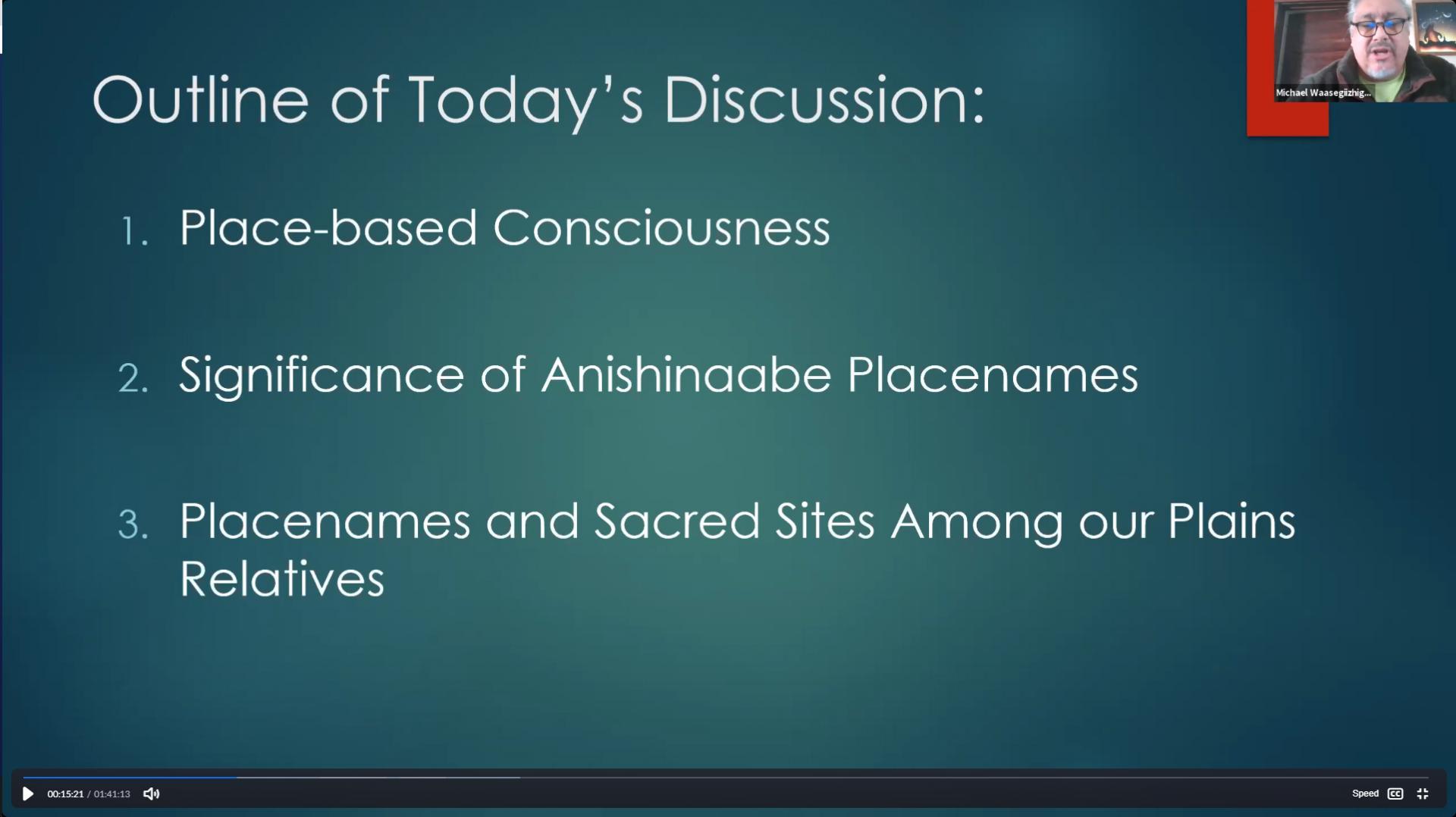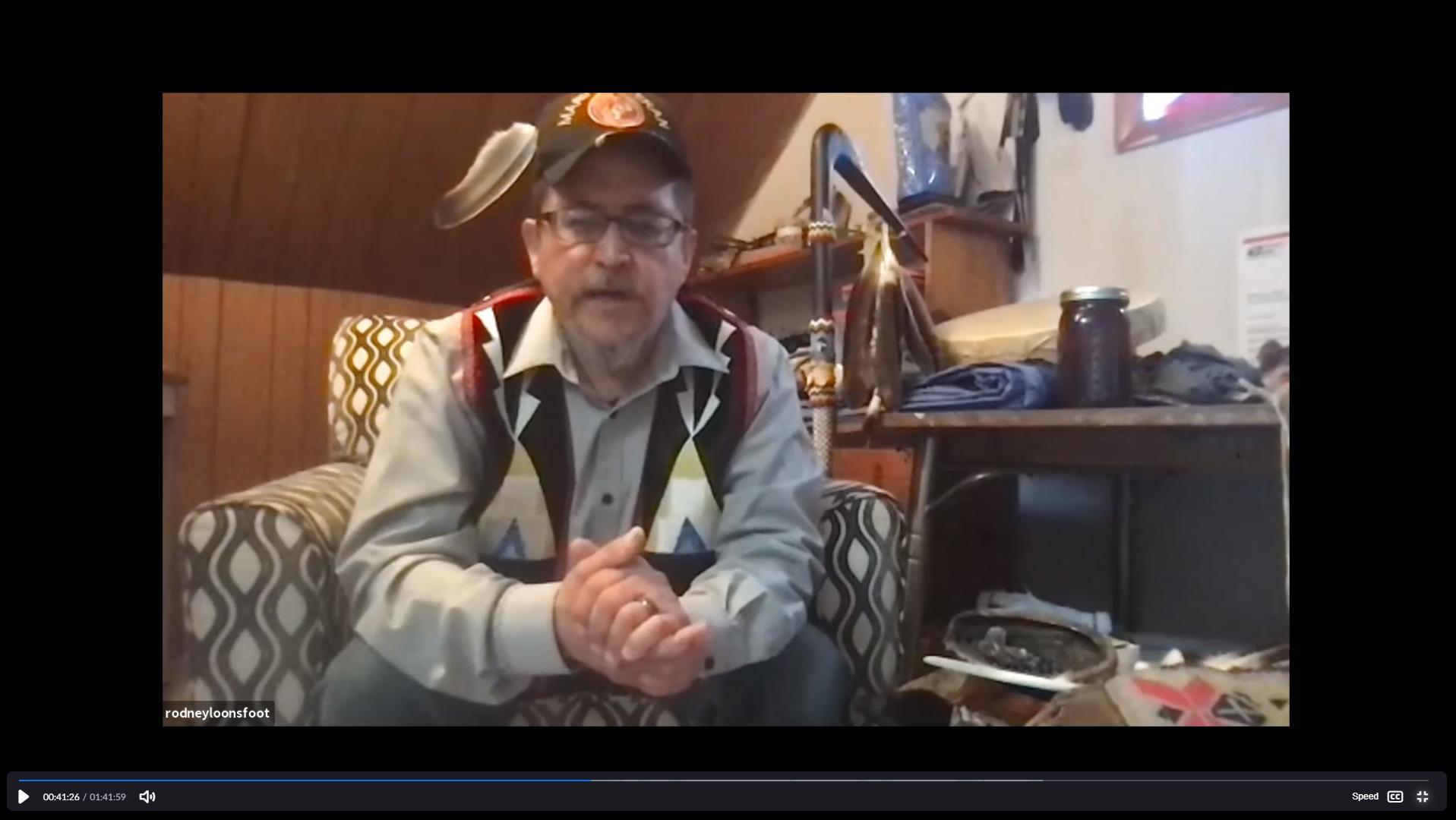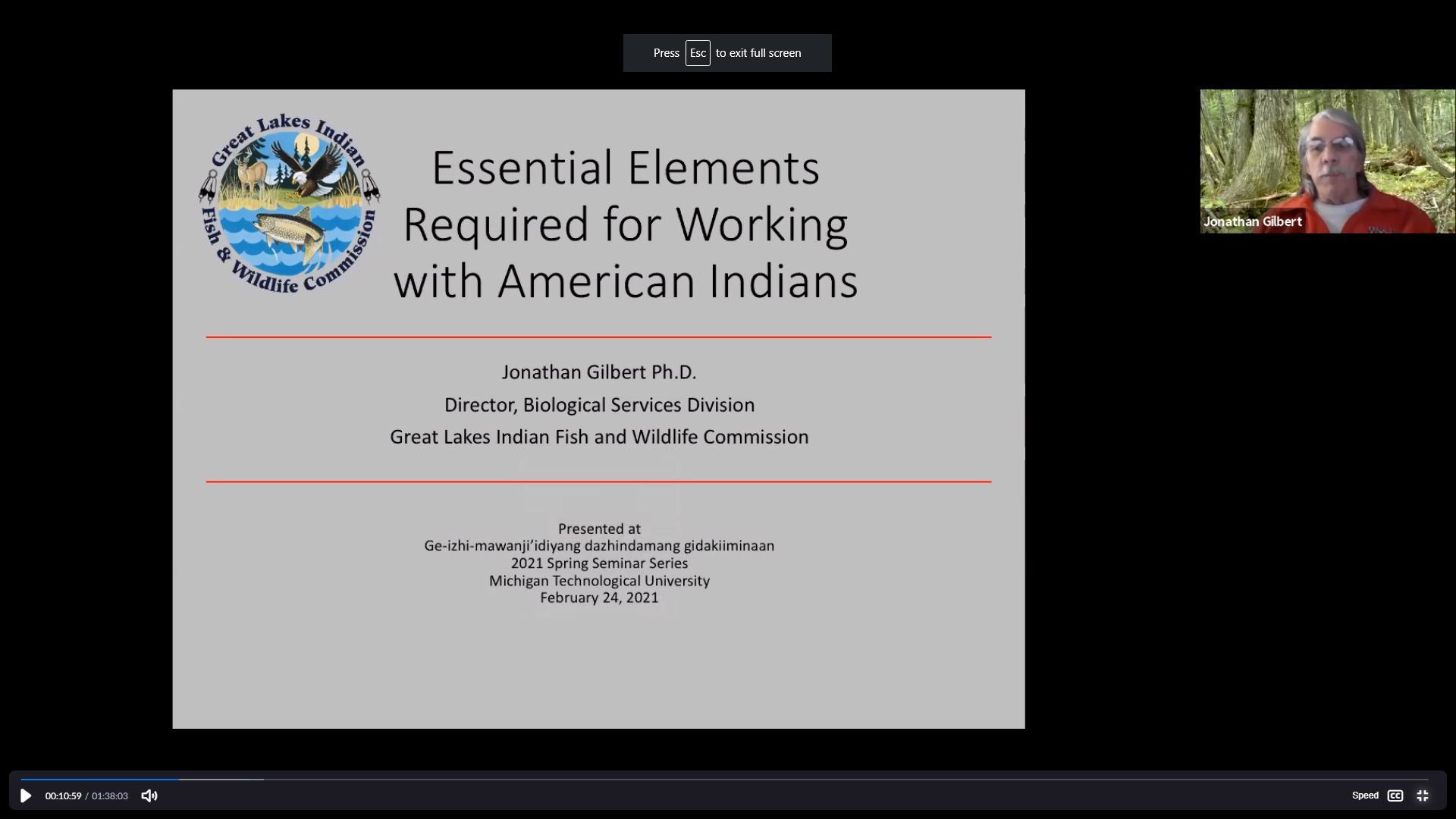How We Talk About Our Earth
This seminar is part of an educational partnership between the Keweenaw Bay Ojibwa Community College, Michigan Tech University, and Great Lakes Indigenous Peoples to enhance learning about our shared environment, called Ge-izhi-mawanji’idiyang dazhindamang gidakiiminaan (“the way in which we meet to talk about our earth”). It began in the spring of 2019 with funding from the Native American Heritage Fund, designed as a knowledge exchange engagement between our schools and communities.
In this seminar, 12 Great Lakes Indigenous knowledge holders shared cultural, ecological, and governance knowledge critical to the resiliency of our shared environment, and engaged in timely dialogue on matters of Justice, Equity, Diversity and Inclusion (JEDI). The goals were to increase our understanding of the diverse perspectives and practices in our region and to continue to build and strengthen a sustainable partnership between our schools and communities into the future.

American Indian Treaties & Food Sovereignty
Our invited guest this week is Dr. Martin Reinhardt, Professor, Northern Michigan University, in the Center for Native American Studies. Participants will learn about how food is included in American Indian treaties, as well as how the US Supreme Court is required to interpret treaty provisions. Lastly, we will discuss implications for community level food access.
Passcode: cty^T!*7

Nibi - Culture, Tradition and Protection
Our invited guest in this week is Kathleen Chosa Smith, enrolled member of the Keweenaw Bay Indian Community who serves as the Habitat Specialist for the Keweenaw Bay Indian Community Natural Resources Department. Students will learn how important Nibi (water) is to Anishinaabe and our role as protectors of Nibi, and giving a voice to those that cannot speak.
Passcode: +Ymfd&0x

Anishinaabe Place Names
Our invited guest this week is Michael Waasegiizhig Price, Traditional Ecological Knowledge Specialist, for the Great Lakes Indian Fish and Wildlife Commission. Participants will learn about the significance of place names in the Ojibwe language. Much knowledge can be obtained about either the characteristics of a particular landscape or an historical event that occurred at a particular place. Place names reflect human beings and their connection to their homelands where they reside.
Passcode: 5GRyyM%1

Anishinaabe Identity and Goals
Our invited guest this week is Rodney Loonsfoot, Tribal Council. In my seminar, I will discuss Community Cultural identity and goals, and goals for Anishinaabe people. I will also talk about Culture CAMP VISION.
Passcode: p#0q@2jW

The Gift of Manoomin
This week's invited guests are Cortney Collia, Educator and cultural teacher, and Roger LaBine, Cultural teacher and Water Quality specialist for the Lac Vieux Desert Band of Lake Superior Chippewa Indians. The importance and processing of wild rice. This seminar presents Anishinaabe teachings and stories of manoomin as a sacred gift from the Creator and identity as a people. We will share visions of regulations and shared management of manoomin harvesting and habitats. I hope we can impress on students the importance of preserving Manoomin in the Great Lakes Basin and they will join a restoration effort and/or become active in a Manoomin group.
Passcode: 37P43V+6

Tribal Natural Resource Stewardship
Our invited guest this week is Erin Johnston, Wildlife Biologist, for the Keweenaw Bay Indian Community, Natural Resources Department. Emphasis on Wildlife In this session students will learn about the Keweenaw Bay Indian Community’s approach to natural resource stewardship through discussion of the KBIC Wildlife Stewardship Plan. Species-specific examples will be provided if time allows.
Passcode: 80ahG2k*

Six Essential Elements in Working with Indigenous People
Our invited guest this week is Dr. Jonathan Gilbert, Director, Biological Services Division, for the Great Lakes Indian Fish and Wildlife Commission. This seminar presentation will offer guidance for researchers, and others, who are planning on working with Indigenous peoples. The six essential elements (ie communication, empathy, respect, flexibility, time and humor) have been developed based on my previous experiences with Indigenous peoples in the Peace Corps and enhanced through my 35 years of working for the Great Lakes Indian Fish and Wildlife Commission (GLIFWC). During the talk, examples of how each of these has come to me will be described in story telling format. My success at GLIFWC is due in large part to the lessons I have learned and hope to describe related to these six elements.
Passcode: 4^+mrxb^

Traditional Ecological Knowledge (TEK) Guidance.
Our invited guest will be Jennifer Vanator, Policy Analyst/Great Lakes Program Coordinator, for the Great Lakes Indian Fish and Wildlife Commission. This seminar will share a presentation of the Traditional Ecological Knowledge (TEK) Guidance Document that was recently developed by the U.S. Caucus of the TEK Task Team under Annex 10 (Science) of the Great Lakes Water Quality Agreement, as well as an outline of a project developed as part of the International Joint Commission's Science Advisory Board and Science Priority Committee that would identify barriers to and support the incorporation of TEK into the science activities that are taking place under the IJC structures. The TEK Guidance Document would be a way to illustrate ways in which TEK and western science might approach natural resource management -- offering opportunities to compare and contrast and ways in which, together, they can enhance ecological management or governance decisions.
Passcode: *a4PY&H.

Our invited guest this week is Karena Schmidt, ecologist of the Keweenaw Bay Indian Community Natural Resources Department. An introduction to the gifts given by plants growing in our wetlands and our role in protecting these special places.
Passcode: z!h*9zJf

Shared Boundaries, Conflicting Interests
This week, our invited guest this week is Doreen Blaker, Tribal Council. The session will cover the Keweenaw Bay Indian Community (KBIC) as a diverse tribal community shaped by our ancestors love and respect for the land. The talk will include information about Tribal government, law, and examples of the KBIC government.
Passcode: F@w2=SdQ

American Indian Law & Policy in the U.S.
This week, our invited guest is the Honorable Violet M. Friisvall Ayres, Associate Judge for the Keweenaw Bay Indian Community Tribal Court. My lecture will be an overview of basic concepts in federal Indian law & policy, tribal law and policy, and the political world that Indian tribes and tribal governments must function in today. Students will come away with a basic understanding of the concepts of citizenship, blood quantum, sovereignty, domestic dependent sovereign status, trust doctrine, jurisdiction, treaty reserved rights, 7th Generation model, and more.
Passcode: fPa$D5m.